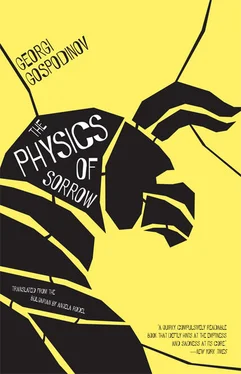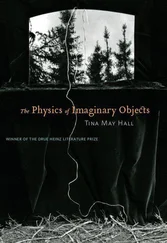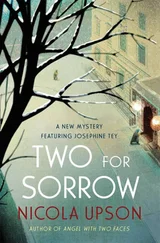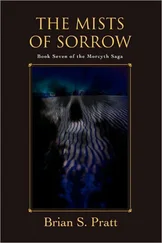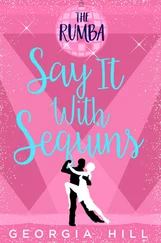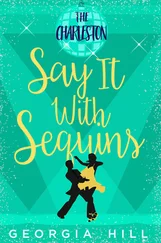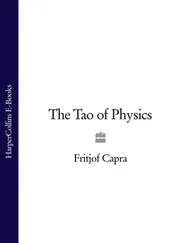In my case, there were no fits per se, my body remained completely calm, if slightly stiff, like a person lost in thought or deeply absorbed in some story. When I fell into such a state, I didn’t blink, my pupils stopped moving, my mouth hung half-open, my breathing switched to some automatic regime, while I (part of me) shifted into someone else’s story and someone else’s body.
I accepted this with a mixture of fear, a vague sense of guilt, and satisfaction. I had put quite a lot of effort into hiding this ability or illness as much as I could. Only my grandmother could always recognize it: “Eh, he’s gone off again.” It often happened against my will. As if right where another felt pain, in that cut, that wound, that point of inflammation, a corridor would open that sucked me inside. In stories, especially those told by loved ones, there was always some blind spot, a momentary gap, a weak point, incomprehensible sorrow, longing for something lost or that had never taken place, which pulled me inside, into the dark galleries of the unspoken. There were such secret galleries and corridors in every story.
For his own peace of mind, the doctor sent me for an MRI, into that enormous white capsule where they cut your brain into thin slices and peer at all its secrets. Relax and think pleasant thoughts, the nurse said.
Two hours later I entered the office of the doctors who would analyze the image, but I could sense from afar their poorly disguised consternation. The picture hadn’t come out. Maybe it was due to the machine, it was old, after all. Actually, this was the first time something like this had happened to them, absolutely nothing could be seen, just a dark-black plate. This didn’t come as a surprise to me. I know nothing can be seen, because inside is darkness, an unilluminable, centuries-deep darkness. My skull is a cave. I didn’t tell them that, of course.
Sometimes — at the same time — I am a dinosaur, a fish, a bat, a bird, a single-celled organism swimming in the primordial soup, or the embryo of a mammal, sometimes I’m in a cave, sometimes in a womb, which is basically the same thing — a place protected (against time).
SIDE CORRIDOR
The tendency toward empathy is strongest between the ages of seven and twelve.
The most recent research is focused on the so-called mirror neurons, localized in the anterior portion of the insular cortex (insula). To put it simply, they react in a similar fashion when a person feels pain, sorrow, or happiness, or when one observes these emotions in another person. Some animals also experience empathy. The connection between shared emotional experiences and mirror neurons has not been well studied; experiments are in the works. Researchers believe that the conscious cultivation of empathy, including through the reading of novels (see S. Keen), will make communication far easier and will save us from future world cataclysms.
— The Journal of Community and Cortex
MY BROTHER, THE MINOTAUR
Still, what was my father doing that night near the yellow house? Okay, so it was part of his job — going wherever they called him. Almost all the town’s residents kept animals in their yards. But what would a veterinarian be doing at a home for the mentally ill? He must have been coming from there, where else would he have appeared from in that wasteland?
Suddenly the whole picture came together in my head with staggering clarity. I say “suddenly,” but in fact the separate pieces of that puzzle had been elaborated carefully and at length with the fastidiousness intrinsic to a child’s imagination. Now everything came together so easily, frighteningly easily within me.
That inhuman howl really was inhuman, and it wasn’t Ooooh, but Moooo. And it came from a half-man, half-bull locked up in there. (I’d already seen one such boy in my grandfather’s hidden memory.) The human doctor hadn’t been able to do anything for the human, so they had decided to treat the bull. Of course, they called the best (and only, incidentally) veterinarian in town: my father.
There was another, darker version of the story, also fine-tuned at length during those lonely childhood afternoons. That half-human-half-bull boy was not just anybody, but my “stillborn brother,” whom I’d heard them whispering about. Actually, he’d been born alive, but with a bull’s head and they’d put him in the home. They had abandoned him. With the best of intentions. So he wouldn’t disturb his healthy brother. I remember that I wrote all that down in my most clandestine (read: secretly illegible) handwriting, rolled the sheet of notebook paper into a scroll and shoved it in my secret box under the bed.
Or maybe I wasn’t even their son at all, instead they had adopted me, despairing of giving birth only to kids with bull-heads?
This was one of the basic fears of my childhood. If this were true, then I could easily be abandoned again. We could be abandoned again, my Minotaur brother and me.
I remember that I devoted the next few days to finding some crack, some door left slightly ajar, through which I could enter into the cave of this secret. I asked my father — ostensibly off-the-cuff and cautiously — what kinds of diseases cows came down with. Had he ever seen Siamese twin calves and what would he do in such a case? Would they kill one to save the other? My father gave absentminded replies. Once, however, he nevertheless let his guard down and launched into some story about a cow who was in labor for fourteen hours right on New Year’s Eve when he had been a kid and. I didn’t hear any more of the story, I simply slipped down the corridor the story had opened up to me. I stopped at the entrance. It definitely wasn’t right to sneak into a father’s secrets. There was something indecent and unnatural about it, you could see things you’d rather not see. I could still hear his voice, he was carried away with his story, I could still turn back. I told myself, I’ll do it only this one time. I pushed on ahead, then quickly ducked into a side corridor of his story, I was no longer interested in it, his voice died away. I wandered aimlessly through my father’s childhood, look how alike we are, skinny, in baggy clothes, probably hand-me-downs, look, there he’s stealing eggs out from under the chicken, they’re still warm, I can feel them, my grandma, his mother (now mine, too), sees me, I run with the eggs toward the general store, if I manage to sell them to Grandpa Angel the shopkeeper, I’ll get a candy bar for each one. I run and run, go into the store, thank God there are no other customers. Grandpa Angel, here are three eggs for candy bars, I wheeze breathlessly, he looks at me, does your mother know, yes, she sent me, he takes the eggs, holds them up to the sunlight, well now, these eggs here are stolen, heeey, how did you know, he gives them back to me, at that moment my mother is coming up the street, I grab the eggs, stuff them in my pocket and dash out, but I trip on the crumbling steps and fall. Careful with those eggs, Grandpa Angel laughs. I feel the yoke seeping over my crotch.
I leave that incident before retribution comes, I turn down another corridor, change direction. I tell myself that I’m not going to lend an ear to things that don’t concern me. At the last minute, I veer away from a girl my father is kissing, I’m kissing, behind the stone wall of the house. She’s attractive, but she won’t become my mother. He’s attractive, too. I’m attractive as well, as long as I’m him. Tall, with curly hair, I feel women’s eyes on me as we pass. That one looks foreign. That one is familiar from somewhere. That one. Wait, now there’s my mother. The answer to the riddle that brought me here should be somewhere around here. I need to turn down some corridor and look on from there, but I can’t move. She’s in pain. The pain is terrible and I can’t stand aside, it sucks me in. Something alive is being torn apart. I’m tearing her apart. Finally, a baby’s cry, that cry comes from me, I am myself, that wrinkly, wet, bluish hunk of meat. Tossed out, choking, shaking all over.
Читать дальше
